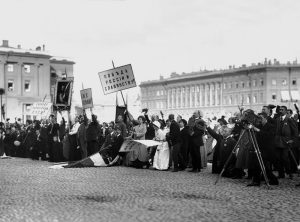Palace Square, St. Petersburg, 20 July 1914.
From russiainphoto.ru.
By Luke Stanek
When we think of our most patriotic moments as a nation, what events tend to surround groundswells of popular patriotism? In most cases, we might look to engagements in conflict, shared national tragedies, or even collective national triumphs as key moments when patriotism emerges. In the case of Russia, historians disagree about the origin point for modern Russian patriotism, but as at least one scholar contends, modern Russian patriotism predates revolution, and may have in fact played a role in bringing revolution about.
On Monday, September 26th, Dr. Melissa K. Stockdale, Professor of modern Russian history at the University of Oklahoma, brought into question existing accounts of the emergence of Russian patriotism. In “All for the Motherland!,” the second lecture in the Fall 2016 Havighurst Colloquia Series, Stockdale argued that it was the First World War during which Russia first saw mass patriotism manifest itself across all boundaries. She began by noting that the Russian perception of the war as just and defensive allowed the surge of patriotism to transcend “class, ethnicity, faith, and ideology,” and therefore served as a rallying point for all Russians to embrace a pan-Russian identity. Stockdale believes that this is most evident through the relief efforts that flourished throughout Russia among people of all backgrounds. She outlined the most important forms of relief in the war effort: care for soldiers and aid for veterans and soldiers’ families. The participation of Russians in relief efforts among the elite, among urbanites, among ethnic minorities, and among peasants is evident across the board through her examination of local, regional, and pan-Russian relief organizations as well as the donations made to these organizations from Russians of all classes, religions, and ethnicities.
It was through this development of relief effort that Stockdale sees the emergence of the idea of citizenship, whereby Russians took on the identity of citizen, and the elite began to see their fellow Russians not as subjects, but as a “competent, organized, vigorous citizenry who [could] be trusted to act.” While the expectation of financial compensation for participation in the war was that it would come from the imperial government, actual relief for injured soldiers came primarily from non-state organizations like the Union of Zemstvos and Union of Cities, which together took care of the majority of the wounded. Additionally, the war, and especially the thousands of relief organizations that emerged to support the war effort, gave women an opportunity to join this active citizenry by taking up relief work by the thousands. Regional ethnic groups, too, formed their own organizations and donated to national and regional relief efforts in support not just of their own people, but of the pan-Russian relief effort as well.
What Stockdale considers most striking about these relief efforts is that they continue throughout the war up until the revolution. Most historians speaking on the subject believe that there was an initial surge in patriotism among the peoples of the Russian Empire that faltered and vanished shortly after the war turned south, but, as Stockdale argues in a recent volume she co-edited, Russian Culture in War and Revolution, 1914-22, “the war experience helped consolidate in the population a sense of membership in a great national community, rather than being a test of patriotism that they failed” (26). So rather than accept that only in the post-revolutionary period do we see strong, widespread Russian patriotism, Stockdale suggests that we ought to rethink what patriotism looked like in the Empire first.
These newfound rights of citizenship that emerged with a surge in patriotism helped instill in Russians that they could indeed take upon the responsibilities of governance; they had proven that they could organize and operate a highly-successful relief effort where the Tsarist state had failed. If Russian patriotism brought with it a heightened sense of responsibility to kin and country, then what was stopping the Russian people from taking upon themselves responsibilities beyond war relief? Perhaps they felt the responsibility to take control of their government, and control of their own destiny, and revolution became the best way to achieve these goals? If the audience member at the lecture found themselves wondering something similar, they will likely find answers to their questions in Stockdale’s forthcoming book, Mobilizing the Russian Nation: Patriotism and Citizenship in the First World War, which hits shelves October 31st.
Luke Stanek is a second-year History MA student.


1 Response to Overturning Traditional Narratives of Russian Patriotism